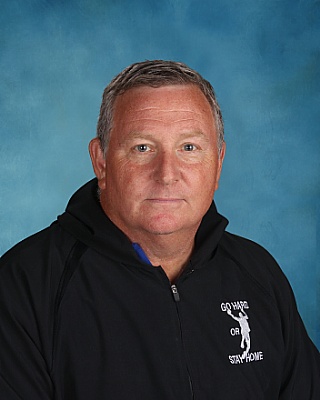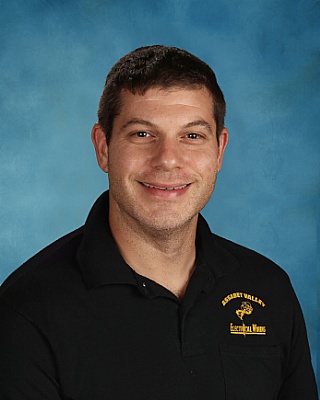- Study More
- Technical Programs
- First Year Exploratory
- Advanced Manufacturing
- Automotive Collision: Repair & Refinishing
- Automotive Technology
- Biotechnology
- Business Technologies
- Computer Programming & Web Development
- Cosmetology
- Culinary Arts & Hospitality Management
- Design & Visual Communications
- Electrical Wiring
- Health Technologies
- Heating Ventilation Air-Conditioning & Refrigeration
- House Carpentry
- Metal Fabrication and Welding
- Painting & Design Technologies
- Plumbing
- Vocational Senior Projects
- Academics
- Assabet Community Education (ACE)
- Career Focused Writing
- Learning Without Walls
- Midterms & Finals
- Parent Teacher Conferences
- Program of Study
- Title I
- Student Work Placement: Vocational Co-Op
- Technical Programs
Electrical Wiring
Meet the Instructors
 Bruce Long, LT
|
 Michael Bizier
|
 Al Maino
|
 Jonathan Williams
|
Program & Course Information
Core Topics:
- Splicing and Terminating Conductors
- Installing Low Voltage Wiring
- Installing Cable Wiring
- Installing Raceways
- Installing Wiring System for Motors
- Installing Transformers
- Wiring Heating Systems
- Installing Current Handling Equipment
- Installing Lighting Fixtures
- Installing Data Systems
- Installing Fiber Optics
- Installing Programmable Controllers
- Installing Industrial Sensors
Courses:
Electrical Wiring - Grade 9
Students entering Electrical Wiring as freshmen are provided with the basic knowledge and skills necessary for success in the electrical field. Students will receive practical instruction on safety and the proper use of hand tools. Students will learn how to draw and wire simple circuits. Freshman students participate and receive a 10 hour OSHA training certification in construction safety, the training provides the necessary background to work safely and the introduction to LOTO lock-out tag-out policies used throughout the school. Students participate daily in Related Theory, where they will learn the proper way to draw and label their circuits. Students create wiring and schematic diagrams that will be used as they build their projects in the shop. Students will splice and terminate conductors using low voltage as well as line voltage cabling. Students will install and troubleshoot low voltage wiring. Upon completion of all low voltage projects students move on to other wiring methods, constructing circuits using non-metallic sheathed and armored cable. Students will begin to build individual project portfolio.
Electrical Wiring - Grade 10
This course is designed to further develop the basic skills and knowledge needed for success in the electrical wiring field. Students will use safety and testing procedures associated with the electrical industry. Special focus is given to the use and understanding of the current Massachusetts Electrical Code, continuation of the safe use and maintenance of hand/power tools. Through continued daily related class work, students will be exposed to the language of the trade with reading and instruction and will be expected to develop an understanding of electrical terminology and the communication of proper trade terms. They will use academic skills to successfully solve problems related to the electrical trade. Sophomore students focus on wiring methods which include metal – clad cable, flexible metal conduit, surface metal raceway, electrical metallic tubing, rigid conduit, and rigid non-metallic conduit. Upon completion of all wiring methods students will showcase their skills in this area by constructing a 100 and 200 amp residential service. Finally, students are introduced to relays and logic control systems.
Electrical Wiring - Grade 11
Safety continues to be a primary focus of the curriculum in electrical wiring, and students will continue to use lock out tag out procedures during the work day. Students continue installing wires for motors and controllers as well as programmable controllers. Students are required to complete a final exam upon completion of motor controls, involving a dual voltage starter. The junior curriculum rounds out with heating and cooling systems, as well as the installation of lighting fixtures, data systems, fiber optics and industrial sensors. Students will participate in the community work extension program, fine tuning the skills they learn in shop. Students will continue to use academic skills to successfully solve problems related to the electrical trade. Finally, students will be prepared for co-op.
Electrical Wiring - Grade 12
Once again safety is the most important aspect of the electrical trade, continuing use of the lock out tag out procedure. Students will install test and troubleshoot the following systems through the use of trainers; fire alarm systems, low voltage control of lighting, and ground fault protection. Students will connect and test single phase and three phase transformers. Students will research, construct, demonstrate, and present senior projects to industry professionals. Students are encouraged to participate in the Skills USA state competition. Skills continue to be honed throughout the work extension program and Co-op placement for eligible students.
Resources, Files & Links for Students
Useful Formulas
Series Circuits - Rules
- Total resistance is equal to the sum of all the resistors.
- Current in the circuit remains the same through all the resistors.
- Voltage source is equal to the sum of voltage drops of all resistors.
- Power of the circuit is equal to the sum of the power of all resistors.
Parallel Circuits - Rules
- Total resistance is always less than the smallest resistor.
RT = 1/(1/R1 + 1/R2 + 1/R3 +...)
- Total current is equal to the sum of the currents of all parallel resistors.
- Total power is equal to the sum of power of all parallel resistors.
- Voltage is the same across each of the parallel resistors.
National Electrical Code
Breaker/Fuse Ratings – 240.6(A)
Conductor Ampacity – 310.15 and Table 310.16
Equipment Grounding Conductor – 250.122
Grounding Electrode Conductor – 250.66
Motor Conductor Size – 430.22 (Single) 430.24 (Multiple)
Motor Short-Circuit Protection – 430.52
Transformer Overcurrent Protection – 450.3
Other Resources
PAGE CONTACTs & Resources
PAGE CONTACTs & Resources
Highlights
Highlights
Electrical Wiring is a program designed to prepare students to install electrical equipment for light, heat, power, motor controls, and data. Students learn various residential, commercial, and industrial wiring methods and techniques according to the Massachusetts Electrical Code. Instruction includes blueprints, schematics, wiring diagrams, layout, installation, cost estimation, and safety.
Students learn in shop simulations, laboratory experiments, and live, on-site jobs with their instructor in the community. After successful completion of the electrical wiring curriculum, the student can earn up to 1500 hours of the required work experience and 300 hours of the education requirements towards state of Massachusetts journeyman electrician apprenticeship program.
